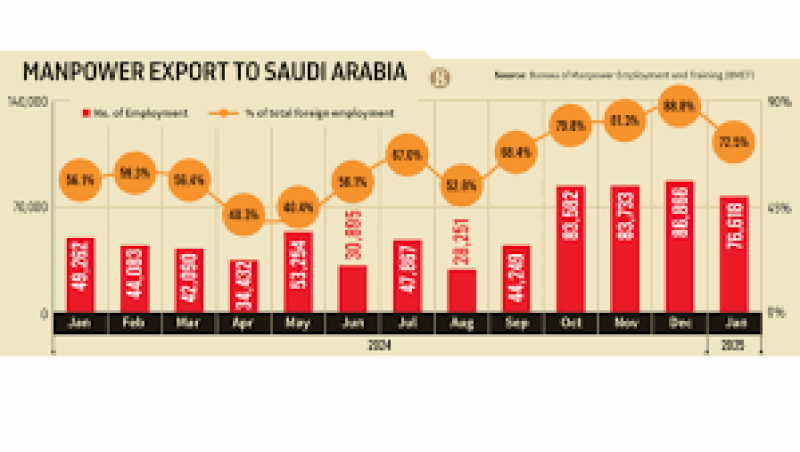- Power generation at Payra Thermal Power Plant 1st unit starts after a month |
- Irregularities, injustice will no longer be accepted in politics: Jamaat Ameer |
- 2 arrested in Jhenaidah for allegedly selling madrasa student |
- Koko’s wife campaigns for Tarique in Dhaka-17 |
- Bangladeshi Expats Cast 4.58 Lakh Postal Votes |
BD's Reliance on Saudi Arabia for Manpower Exports Grows

Bangladesh continues to heavily rely on Saudi Arabia for its manpower export, with a staggering 72.5% of the country’s overseas workers heading to the Gulf nation in January. This dependence underscores the shrinking opportunities in other labour markets, as overall overseas employment saw a 7.33% month-on-month decline.
Data from the Bureau of Manpower Employment and Training (BMET) shows that Bangladesh sent 97,862 workers abroad in January, a decrease from the previous month but an 11.39% increase compared to January 2024. Of these workers, 76,618 went to Saudi Arabia, reinforcing its position as the dominant destination for Bangladeshi workers. Qatar, Singapore, and Kuwait followed with 6,880, 4,847, and 2,878 workers, respectively. Meanwhile, Malaysia, which has suspended regular recruitment since June 2024, only accepted 1,286 workers, mainly for the plantation sector.
Saudi Arabia hosts an estimated 3 million Bangladeshi workers, and recent BMET data reveals that in November, Saudi Arabia alone accounted for 81% of Bangladesh’s foreign workforce. This share surged to 89% in December.
Challenges in Shrinking Markets
Labour recruiters are voicing concerns about the declining prospects in traditional job markets such as Oman, the UAE, and Malaysia. These countries are either reducing their intake of foreign workers or closing their doors entirely to new recruits.
The influx of remittances, however, continues to be a bright spot. Bangladesh saw $2.19 billion in remittances in January 2025, a 3.4% increase from the previous year, marking the sixth consecutive month of remittance inflows exceeding $2 billion.
However, experts warn that the country's reliance on a single market, particularly Saudi Arabia, presents risks. “A major shortcoming in overseas labour flow is its heavy dependence on one market at any given time. Countries that have been the primary destination for Bangladeshi workers can suddenly close or drastically reduce their intake,” said Tasneem Siddiqui, founding chair of the Refugee and Migratory Movement Research Unit. Siddiqui also pointed to the instability caused by illegal visa trading, which exacerbates these risks. She stressed the importance of properly assessing employers through Bangladesh embassies abroad and recruitment agencies to mitigate these challenges.
Trouble in Malaysian and European Markets
In Malaysia, authorities are now only recruiting workers for the plantation sector, and the deadline for sending workers has been extended to March 31, 2025. However, recruitment certification will cease by February 15, as the Bangladesh High Commission in Malaysia will stop certifying recruitment documents.
Bangladesh’s labour exports to Europe are also encountering hurdles. Although countries like Portugal (458), Italy (335), Croatia (300), Hungary (135), and North Macedonia (86) recruited Bangladeshi workers in January, many workers are violating agreements by moving to other Schengen countries. This has led to a decline in work permits for Bangladeshis. In fact, Croatian authorities have expressed concern over the illegal migration of Bangladeshi workers holding Croatian permits. Of the 12,400 work permits issued to Bangladeshis in 2024, only about 50% of the workers remained employed in Croatia, while thousands used their permits to enter other European nations illegally.
Sharmin Akhtar Shumi, chairperson of Infinity HCM, a recruitment agency, highlighted the rising number of visa rejections from countries like Italy, France, and Germany due to workers failing to stay in their assigned destinations. “This is causing significant harm to the labour market,” she said, urging the government to take corrective action and reopen the closed markets in the Middle East to diversify the sources of foreign employment.
As Bangladesh's reliance on Saudi Arabia continues to grow, the need for a more diversified labour export strategy has never been more urgent. The country's officials and labour agencies face a challenging task in stabilising and expanding opportunities for overseas workers while managing the risks associated with over-dependence on one market.

